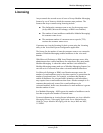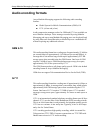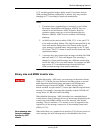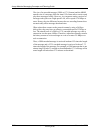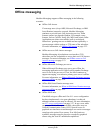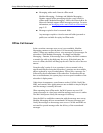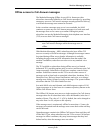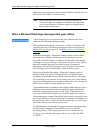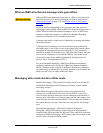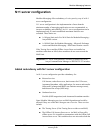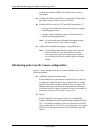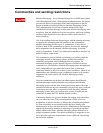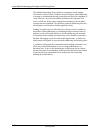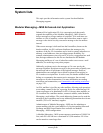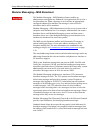
Modular Messaging features
November 2004
Avaya Modular Messaging Concepts and
Planning Guide
5-25
When an IBM Lotus Domino message store goes offline
When an IBM Lotus Domino message store is offline, Call Answer and
subscriber access to Call Answer messages take place as described in
Offline Call Answer
on page 5-22 and Offline access to Call Answer
messages on page 5-23.
However, creation and sending of new messages and other aspects of
messaging are not available when an IBM Lotus Domino message store is
offline. When an MAS fails repeated attempts to access an IBM Lotus
Domino message store because it is offline, the Modular Messaging
telephone user interface (TUI) terminates the session.
Customers can achieve a high level of redundancy by homing subscribers
on Domino clusters.
A Domino cluster comprises two or more Domino servers that mirror
each other's data. If one of the servers in the cluster fails, Domino clients
(including the messaging subsystem used by the TUI) are seamlessly
switched to another server in the cluster. This allows the Domino message
store to run at a higher level of overall availability, since nodes in the
cluster can be taken down without significantly affecting clients. In
practice, this is all transparent to the TUI.
In a Avaya Modular Messaging—IBM Lotus Domino environment,
mailboxes and directories are stored in IBM Lotus Domino databases.
Within a Domino cluster, replicas of mailboxes and directory databases
are continuously synchronized. If a primary database is not available, the
MAS units fail over to a replica within the cluster.
Messaging with e-mail clients in offline mode
Modular Messaging—MSS (with Client Add-in for Microsoft Outlook)
and Modular Messaging with Exchange and Domino, support offline
messaging sessions.
With offline messaging, subscribers can have messages from their
message store synchronized with a local file on their PC so they have
access to those messages when they are not connected to the network or
message store. Subscribers can listen to, reply, forward, and compose new
voice messages from their multi-media PC. New messages will remain in
the outbox until the next time subscribers are connected to the message
store.
With Modular Messaging—Microsoft Exchange and Modular
Messaging—IBM Lotus Domino, all messages (new and opened) are
included in the offline message file. Whereas Client Add-in for Microsoft
Outlook for Modular Messaging—MSS caches copies of messages on the
local PC after a message has been opened.



